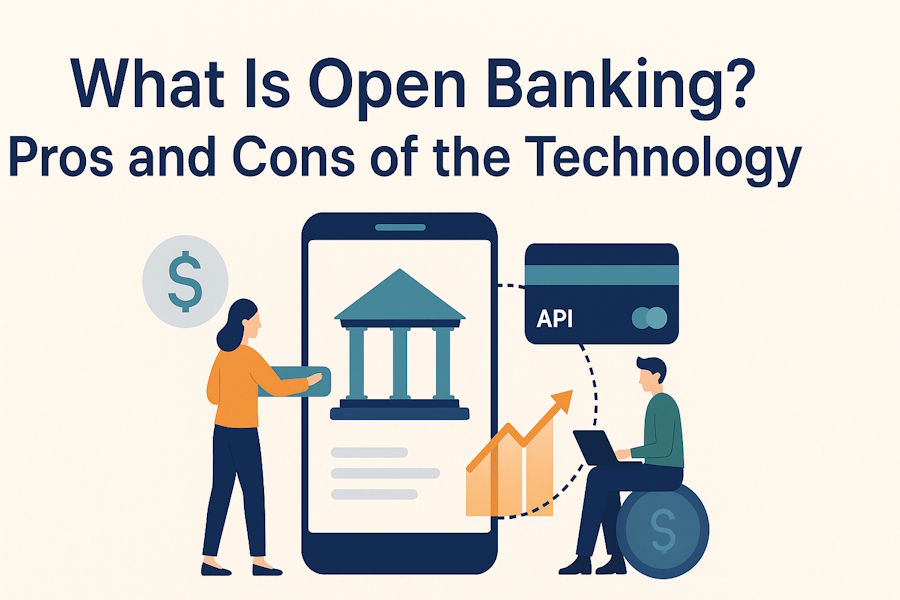Have you ever wondered what it would be like to see all your financial accounts in one place, or to let an app automatically help you save, invest, or pay bills? That is the idea behind open banking. It allows you to share your financial data securely with trusted apps and services to improve how you manage your money. This is made possible using a bank API service, which acts as a bridge between your bank and the chosen app.
Open banking is growing fast around the world, and it is changing how people interact with their money. But like any technology, it comes with both benefits and risks. Understanding how it works can help you make smart choices and feel more confident about trying it. Let’s explore what open banking really means and why it matters for your financial future.
Open Banking in Simple Terms
Open banking is a system that lets banks and financial institutions share customer data with third-party apps or services. This only happens if the customer gives permission. The goal is to give people greater control over their financial information and more options for managing their money.
For example, you might use a budgeting app that pulls in data from your savings and credit card accounts. Instead of entering everything manually, the app uses a secure connection to read the information directly. This connection is made possible using a technology called API, which allows different systems to talk to each other safely.
The idea is to make banking more flexible and personalized. It provides consumers with smarter tools for saving, budgeting, investing, and borrowing. At the same time, it challenges banks to improve their services by working alongside new tech companies.
The Benefits of Open Banking for Everyday Users
One of the biggest advantages of open banking is convenience. You can manage all your accounts in one app, no matter which bank you use. This provides a comprehensive view of your finances, making it easier to plan, track, and enhance your money management habits.
Another benefit is automation. Many open banking apps offer tools that help you save money, find better loan rates, or even invest spare change. These tools can take action on your behalf based on your financial behavior. This type of automation can be especially beneficial for individuals who struggle to save or adhere to a budget.
Open banking also encourages competition. When more companies can access financial data (with your permission), they can create better products and services. That means lower fees, smarter tools, and more choices for you.
Risks and Concerns You Should Know About
While open banking offers more freedom, it also raises concerns. Sharing your financial data, even with permission, means putting trust in more than just your bank. That data has to move across systems, and every step must be secure.
There is always a small risk that data may be misused or compromised. That is why regulations are in place to protect users. Still, you should only use trusted apps and platforms that follow strict security rules. Check reviews, privacy policies, and look for official certifications before connecting your accounts.
Another risk is confusion. Not all users fully understand what data they are sharing or how it will be used. Some apps may use the data to offer helpful services, while others may use it for marketing or tracking purposes. Always read the terms carefully and make sure you are comfortable before agreeing.
How Businesses and Banks Benefit from Open Banking
It is not just consumers who gain from open banking. Banks and businesses also benefit. By opening their data through APIs, banks can partner with financial technology companies to provide their customers with better tools.
For businesses, open banking allows easier access to financial services. For example, small businesses can utilize apps that integrate with their bank to track invoices, manage payroll, or apply for credit more efficiently. This saves time and helps them grow more efficiently.
Banks also get a chance to innovate. Instead of losing customers to tech companies, they can collaborate with them to provide more effective solutions. In many ways, open banking transforms competition into collaboration, creating more value for all parties involved.
Regulations and Security: Who Keeps It Safe?
Security is a top concern in open banking, and most countries have established regulations to protect users. These rules require banks and third-party apps to follow strict guidelines for how they handle and protect data.
For example, in Europe, the PSD2 regulation requires banks to open their data securely. In many other countries, similar frameworks exist or are being developed. These systems often require two-factor authentication, data encryption, and clear consent processes.
As a user, you also have power. You can choose who gets access to your data and can revoke access at any time. You should always verify that the service you are using is licensed or certified by a national authority or regulatory body.
Is Open Banking Right for You?
If you like using apps that help you save, invest, or track spending, open banking could be a great fit. It removes the hassle of logging into multiple accounts and lets smart tools do some of the work for you. It is especially helpful for people who want more control over their money but do not have a lot of time.
However, if you are very cautious with your privacy or do not trust technology easily, you might prefer to stick with more traditional methods. There is nothing wrong with managing your money without third-party tools. What matters most is using a method that works for your comfort level and lifestyle.
Start small. Try connecting a savings account to a budgeting app you trust. Watch how it works and how your data is handled. If it feels good, explore more features. If not, you can always disconnect. Open banking is not an all-or-nothing proposition. It is about giving you the choice to manage money your way.








